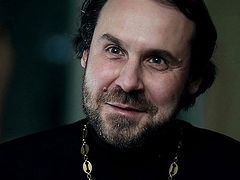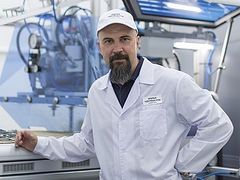The recent prolonged lockdown has caused an increase in the number of needy persons.
“People are either losing their jobs or taking unpaid leave. In some regions the number of requests for help has increased dozens of times over,” says Deacon Igor Kulikov, assistant to the Chairman of the Synodal Department for Church Charity and Social Ministry.
We have contacted the social departments of the most impoverished dioceses and taken down some vignettes on assistance to people. We share some of them below.
The Diocese of Tver
A baby’s life has been saved
“We have nothing to eat,” Olga confessed when we asked her why she was planning to have an abortion. It was during the pandemic. She has two children: an older daughter and a little son.
“She met a man and soon became pregnant by him. He said that he didn’t want a baby and broke up with her. She was left alone with two children and a third one in her womb. She realized that benefits wouldn’t be enough to provide for the children; and since her daughter is eighteen, she is too old to receive the additional state allowance for large families,” Olga Prokhorova from the Tver Diocese’s Department for Social Ministry related. “We provided her with food, paid for her housing and utilities, and she decided not to have an abortion.”
Recently a convent donated fifty bags of potatoes to the Diocese of Tver. We wanted to find someone to deliver the potatoes to Olga. Suddenly a mother with many children who had just lost her husband volunteered to help us. As soon as Olga learned that her namesake was expecting a baby, she slaughtered a hen and brought her fresh eggs.
“Now Olga is not alone. She believes she will be able to raise her kids. And we’ll support her,” Olga Prokhorova added.
A family with a baby didn’t become homeless
“We are being turned out onto the street!” a woman appealed to us with these words. She was being evicted from a room she was renting. She has two children, one of whom is a baby. The father had deserted them and they lived on benefits. Their money had run out, and the benefits hadn’t been transferred yet. We helped them take another room on lease and pay for the first month of rent and then brought them some food. As a result the family hasn’t become homeless,” Olga Prokhorova told.
The Diocese of Nakhodka (Russia’s Far East region)
Three packets of coffee
 “I lost my husband not long ago, and I need everything,” the seventy-five-year-old Rimma Konstantinovna said.
“I lost my husband not long ago, and I need everything,” the seventy-five-year-old Rimma Konstantinovna said.
She moved to Nakhodka with her husband and after the war they contributed to the city’s revival. When he passed away, she came to the city museum with his documents, photographs and awards.
“It was important for her to preserve the memory of her husband, while she didn’t speak of her own merits. When I brought her food last time and she invited me in, I walked along a long shabby corridor for a long time. When I entered her room, I saw that there was only enough space for a bed and a table in it; a rustic plastic washstand was hanging on the wall instead of a sink,” Administrator of the Respite Care Home of the Nakhodka Diocesan Social Department Ludmila Chumak related. “Rimma can walk with difficulty, leaning on a stick. She wanted to repay my favor; three packets of coffee lay on her table. She said, ‘Please, take these three packets. I insist, take them!’”
All the food was destroyed in a fire
“I’ve had a fire! I’ve had a fire!” an old lady repeated many times when some food was delivered to her.
Recently she suffered fire damage—her electric stove caught fire while she was sleeping. In the middle of the night she was woken up by the smell of burning, ran out onto the balcony and called for help. Someone heard her and called the fire department.
In the end she had to throw away all the food she had in her apartment. Somehow she needed to survive till she got her pension money.
“Everything around me was on fire!” the old lady kept complaining.
“I’m sorry I couldn’t come downstairs”
 “I walked up the stairs and when I reached the fourth floor I was met by a gray-haired man in a gray T-shirt; there was a piece of cloth where once he had had legs. He opened the door wide, inviting me inside and apologizing, ‘I am very sorry I couldn’t come downstairs to meet you and help you carry the bag,’” Ludmila Chumak recalled.
“I walked up the stairs and when I reached the fourth floor I was met by a gray-haired man in a gray T-shirt; there was a piece of cloth where once he had had legs. He opened the door wide, inviting me inside and apologizing, ‘I am very sorry I couldn’t come downstairs to meet you and help you carry the bag,’” Ludmila Chumak recalled.
Recently she saw a young man wearing a glove when she handed over a food parcel to him.
“The glove was floppy—he had no hand,” Ludmila added.
The Diocese of Tikhoretsk (the Krasnodar territory)
The children remained in a family
There is a village in the Krasnodar territory near the Kuban River where large families live.
“They live in tiny, one-room wooden cottages heated by no more than a wood-burning stove. The nearest store, in a neighboring Cossack village, is about a forty minutes’ walk up a steep hill. Most of the residents are single mothers who receive no allowance for large families. We help them with food, clothes, shoes and provide them with some heating,” Archpriest Cassian Kravtsov, Chairman of the Department for Social Ministry of the Tikhoretsk Diocese, told us.
“When we got there to see one of such families, we saw a fence falling over and a patched-up roof; the stove had cracked and was on the point of falling apart. When wood was burning, you could see flames blazing up through the crack in it. There are five children in the family.
“A fire could have broken out at any moment or they could have gotten carbon monoxide poisoning. We sent them to a crisis center for the time being so that their kids would not be taken away by social workers; we have also helped them repair their house and fix their stove. The children have remained in the family,” Fr. Cassian added.
The Diocese of Vyksa (Nizhny Novgorod region)
Only one potato
During the lockdown the diocesan social department made the following announcement: “If you need help, please phone us.” One day we received around 500 requests for help.
“I have only one potato left. Do you think I should cut it in half or fry it whole?” an old woman asked us. We helped such people first of all. In our region we have around 1,000 pensioners whose state pension is less than 10,000 rubles [c. 145 US dollars.—Trans.], though they have to pay between 3,000 and 5,000 rubles [between forty three and seventy-two US dollars.—Trans.] for housing and utilities, depending on the size of the apartment. They have just enough money to buy some food and medicine,” Chairman of the Youth and Social Ministry Departments of the Diocese of Vyksa Sergei Matyugin said.
“Help those who are having the hardest time”
“Help those who are having the hardest time,” an elderly woman said as she donated 8,000 rubles [around 115 US dollars.—Trans.] to the diocesan social department.
“It took her months, if not a year, to collect this amount of money. She has been caring for her handicapped and bedridden husband and son for years,” Sergei Matyugin related. “And you can quite often find such people. They are in dire straits but they’re trying to help those whose situations are even worse.”
The Cubans hadn’t eaten for three days
“‘The last time we ate something was three days ago,’ some Cuban immigrants informed us. They came here from Cuba in search of temporary work, but the company that hired them has closed down,” Sergei Matyugin said. “After losing their job they lived in a derelict house of a summer village. When their food ran out, they decided to find a church and ask for help there. We provided them with food parcels and other basic necessities. They promise that once they have found employment, they will become our volunteers—as it has turned out, one of them is a cook.”
***
There are 198 dioceses in Russia, and they have social departments that lend a helping hand to those less fortunate: low-income families, seniors living alone, the disabled and the homeless.
“The social department of every diocese distributes food parcels and financial aid among 500 to 10,000 indigent people monthly. All of this became possible thanks to donations from ordinary parishioners and occasional large contributions from benefactors. The lockdown lasted over two months, which means that most believers couldn’t go to church and donations have fallen dramatically. Businesses have suffered significant losses as well, so most social services have lost their benefactors and have no more funds to render aid to those in trouble. However, they can’t stop helping those in need because people turn to the Church as a last resort when no one else can lend a hand,” Deacon Igor Kulikov concluded.
There are many dioceses in the vast expanses of the Russian Federation and nations of the former Soviet Union where people are in acute need of basic foodstuffs. In Kygyzia, for example, people have been found in their homes who have died from hunger (please see this article). This problem has escalated with the joblessness provoked by the coronavirus epidemic. The website, Miloserdia.ru, which operates with the blessing and oversight of Bishop Panteleimon (Shatov) of Orekhova Zuyevo, Chairman of the Moscow Patriarchate Synodal Department for Church Charity and Social Ministry, is a platform through which people can donate money to such causes as aid to the hungry. The charity department is in particular need right now, as many benefactors are experiencing financial difficulties. Miloserdia means “mercy”, or “charity”.
If you would like to help, please visit their donations page for charity originating outside of Russia. You can translate the page by opening it in Chrome, right clicking the page, and choosing “Translate to English”. The current exchange rate is 69.4 rubles to the US dollar, which makes a donation of 200 rubles only $2.88. Even this amount can mean life or death. Please consider helping these people in this difficult time.
The food assistance coordinator, Deacon Igor Kulikov, can also be contacted: ikoulikov@gmail.com
+ 7-926-583-52-82






